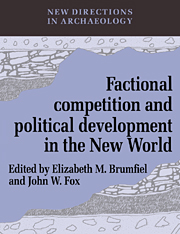Book contents
- Frontmatter
- Contents
- List of figures
- List of tables
- List of contributors
- Preface
- PART I INTRODUCTION
- PART II CHIEFDOMS
- PART III STATES
- 7 Ethnicity and political control in a complex society: the Tarascan state of prehispanic Mexico
- 8 Ethnic groups and political development in ancient Mexico
- 9 Factional divisions within the Aztec (Colhua) royal family
- 10 Alliance and intervention in Aztec imperial expansion
- 11 Political factions in the transition from Classic to Postclassic in the Mixteca Alta
- 12 Internal subdivisions of communities in the prehispanic Valley of Oaxaca
- 13 Cycles of conflict: political factionalism in the Maya Lowlands
- 14 Political cosmology among the Quiché Maya
- 15 Factions and political development in the central Andes
- PART IV DISCUSSIONS
- Bibliography
- Index
15 - Factions and political development in the central Andes
Published online by Cambridge University Press: 18 December 2009
- Frontmatter
- Contents
- List of figures
- List of tables
- List of contributors
- Preface
- PART I INTRODUCTION
- PART II CHIEFDOMS
- PART III STATES
- 7 Ethnicity and political control in a complex society: the Tarascan state of prehispanic Mexico
- 8 Ethnic groups and political development in ancient Mexico
- 9 Factional divisions within the Aztec (Colhua) royal family
- 10 Alliance and intervention in Aztec imperial expansion
- 11 Political factions in the transition from Classic to Postclassic in the Mixteca Alta
- 12 Internal subdivisions of communities in the prehispanic Valley of Oaxaca
- 13 Cycles of conflict: political factionalism in the Maya Lowlands
- 14 Political cosmology among the Quiché Maya
- 15 Factions and political development in the central Andes
- PART IV DISCUSSIONS
- Bibliography
- Index
Summary
Investigators of prehistory generally concur that political competition has often been critical to the development of social complexity. Among the key forms of political contention are hierarchical, peer, polity, expansionist, and factional competition. These are politically joined processes whose significance varies (1) as the complexity and reach of the sociopolitical unit is transformed, (2) as the interaction emphasizes internally or externally directed conflict, and (3) as the competition is structured vertically (e.g., between classes) or horizontally (e.g., between polities). This paper focuses attention on factionalism in the Upper Mantaro Valley, Peru, during the late pre-Inka, Inka, and early colonial periods. These successive periods provide an excellent opportunity for examining how political activity was transformed as the context of interaction shifted rapidly from autonomous, to imperial, to colonial rule (Fig. 15.1).
Before discussing the case studies, I would like to underscore four main points concerning the role of factional competition in political development. First, although they lie outside sanctioned structures of sociopolitical interaction, factions pervade political activity from the simplest to the most complex societies. Second, because factionalism often cross-cuts more formal sociopolitical groups, it provides a means by which individuals or groups restructure ties to obtain power and resources (Salisbury and Silverman 1977). The groups that are formed are often volatile, ephemeral, and based on mutual short-term goals, but the outcome of the competition may be a reformation of more formal kinds of political interaction or, less radically, a shift in leadership. Third, despite the scant archaeological interest in factionalism in empirical studies, numerous theories contain this kind of competition as a key element of political change.
- Type
- Chapter
- Information
- Factional Competition and Political Development in the New World , pp. 171 - 188Publisher: Cambridge University PressPrint publication year: 1994
- 8
- Cited by



